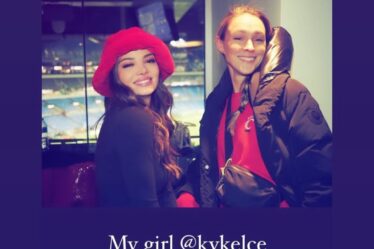
The beauty industry is banking on a Christmas miracle.
Throughout the retail sector, the last three months of the calendar year are referred to as the “golden quarter”, with some brands generating as much revenue in that period as they do throughout the rest of the calendar year, according to retail strategist Wizz Selvey, as shoppers splurge on their loved ones — and themselves.
Beauty, in particular, goes big for the holidays. Brands roll out special holiday promotions, including gift sets (a mixture of full or travel-size products and a limited-edition pouch or case) and beauty advent calendars, which are sold by brands and retailers including Space NK, Harrods and Charlotte Tilbury. The calendars in particular are subject to high demand, often selling out months before Dec. 1 and retailing for triple-digit figures.
But this year, times are looking leaner. A UK report by KPMG and the think tank RetailNext found that 39 percent of consumers will have a smaller gift budget this year, which the report chalks up to high interest rates on mortgages, as well the overall higher cost of living.
A potential pullback could have long-lasting ramifications for many beauty brands. “It’s got a lot harder to get cut through with digital advertising,” said Selvey, adding that Christmas gifting can also serve as a marketing tool for many brands.
Still, the beauty sector has reason to be optimistic. Foot traffic software monitoring company Placer.Ai says visits to beauty and self care stores were up 3.7 percent in October year-on-year, with visits to Ulta Beauty in particular up 16.5 percent. Consumers are still shopping, but their priorities have shifted.
“Our customer is sustainably-minded,” said Jennifer Hill, chief executive of Los Angeles-based skin care label Thomas Grove. “They’re not going to buy as many gifts but the ones they do buy will be really thoughtful and special.”
Beauty brands can’t risk wider slippage against a backdrop of increased competition, both in terms of assortment and for eyeballs online. To combat any cooling consumer demand, brands are starting the holiday season earlier than ever — or forgoing holiday promotions entirely to focus on selling their core assortment.
Christmas Come Early
To maximise spend, many brands are starting promotions earlier. Research from the British department store John Lewis found that a fifth of shoppers start preparing for Christmas as early as October, suggesting that consumers are both excited for the holidays, but also looking to spread the cost over a longer stretch of time.
Selvey added that starting promotions early allows businesses more time to get in front of customers.
The brands that are able to get a headstart on the holiday season will find they have a leg up in customer acquisition, not only during the winter months, but year round. The hope is that during the holiday season, they can turn customers into evangelists, passing along the products to loved ones who may, in turn, become customers themselves. If a brand has a fan in a particular customer already, and they can offer something at a price point that the customer deems giftable, “you’re potentially acquiring new customers,” explained Selvey.
Ayurvedic-inspired hair care line Chāmpo, for example, sells gift sets all year, but begins holiday promotions in mid-October. The brand is expecting to double the sales made in last year’s holiday season, and is surpassing forecasted performance so far, said founder Kuldeep Knox.
Retailers will ask brands about their holiday offerings well ahead of the season, and there can be pressure to contribute more maximalist offerings, brands say.
Particularly for smaller brands, that can be a heavy lift. At Thomas Grove, which makes a single SKU, a multi-purpose oil, that the brand ran into trouble sourcing fabric for a limited-edition bag it hoped to release earlier on in the holiday shopping season, said Hill. With delays, it won’t be available until mid-November, some six weeks after many brands start selling their festive offerings. Hill chalks it up to limited availability for the kind of quality fabric she wanted, but said she “wished that [we had] the bag out a bit sooner this year.”
Brands that run into such snafus can find creative workarounds. Camille Bell, co-founder and chief experience officer of inclusive lip colour line Pound Cake, said that despite attempting to find a supplier to create a holiday gift set for the brand as early as June, the brand was unable to find one that could make a set according to their specifications. Instead, she and co-founder Johnny Velasquez will be making the most of an existing bundle comprising all of their shades, and highlighting that offering in Ulta Beauty’s holiday catalogue. Next year, the company will start the procurement process even earlier.
“Our main priority is working with our retail partners and utilising their big network,” said Bell.
Mindful Shopping
With those difficulties in mind, some brands are eschewing traditional holiday specials altogether and finding other ways to engage consumers during the shopping season.
“We’ve done three or four different Christmas sets, and what we’ve seen is that the retailers are very enthusiastic about it, but then they’re discounting them as they’re not selling through,” said co-founder Eva Alexandrides, the co-founder of 111Skin, the London-based high-end skin care line. Value sets already represent a discount, she added, so seeing them reduced by another 20 or 30 percent in January stings. Instead, 111Skin is partnering with select retailers within its network to allow shoppers to create custom gift boxes of full-size products. They’ll also be hosting a masterclass for VIP shoppers, previewing a new launch for 2024. Their focus, said Alexandrides, is conscious gifting.
“It’s a hard balance to strike,” she admitted. “But if you have leftover holiday sets, which you have to discount, it’s going to affect your next year of trade.”
Thomas Grove’s approach is similar. If shoppers choose to purchase the pouch and oil together, there’s a small value saving, but the brand isn’t offering another holiday special.
While it may seem brands that forgo holiday specials are electing not to participate in one of the industry’s most lucrative periods, this year, a slower approach might chime with current concerns, said Selvey.
“People try[ing] to shop more mindfully,” she said, adding that people may not buy gifts this year for those they’re not as close to, but those they do shop for, they’ll want to really indulge.



